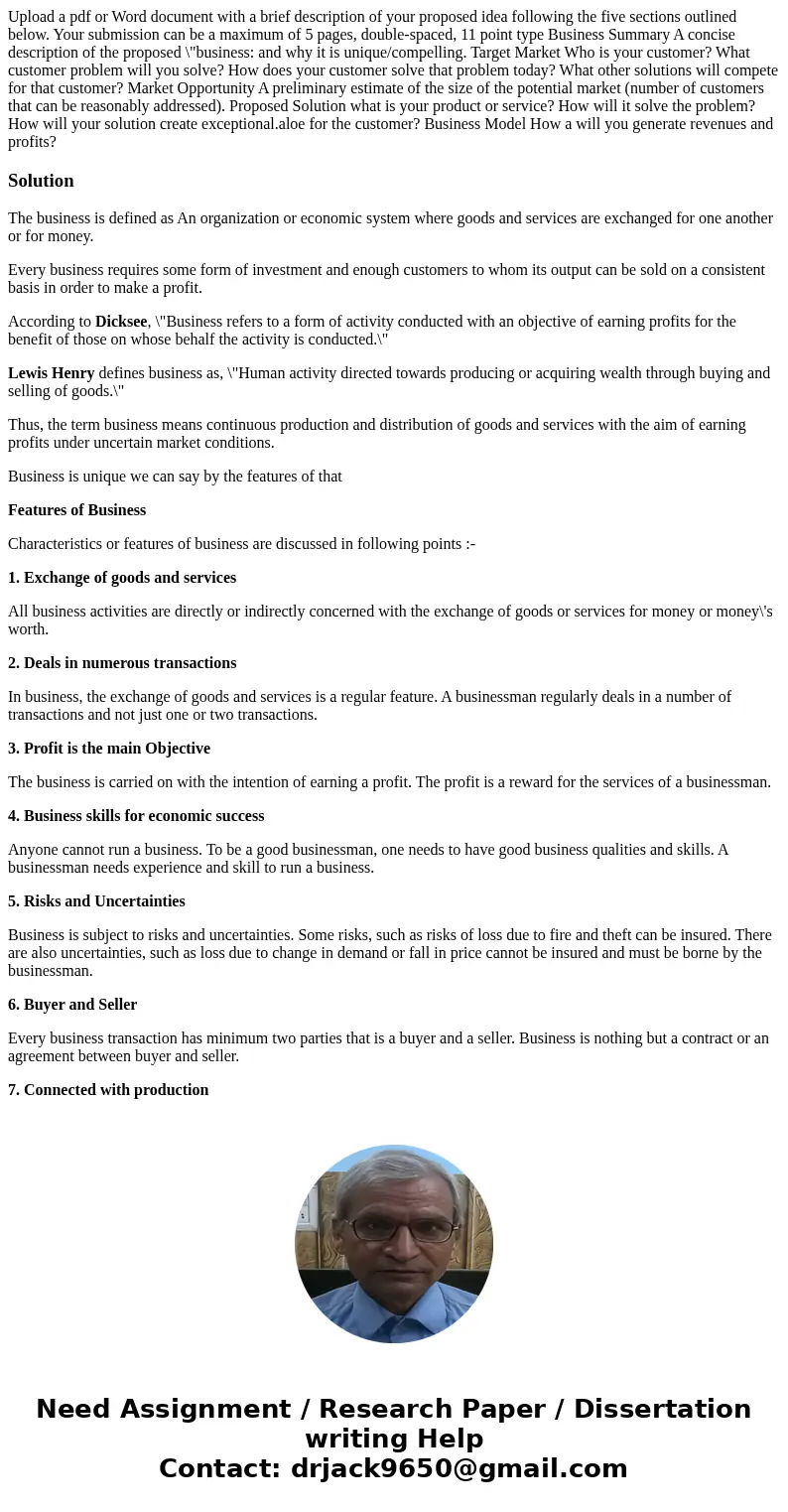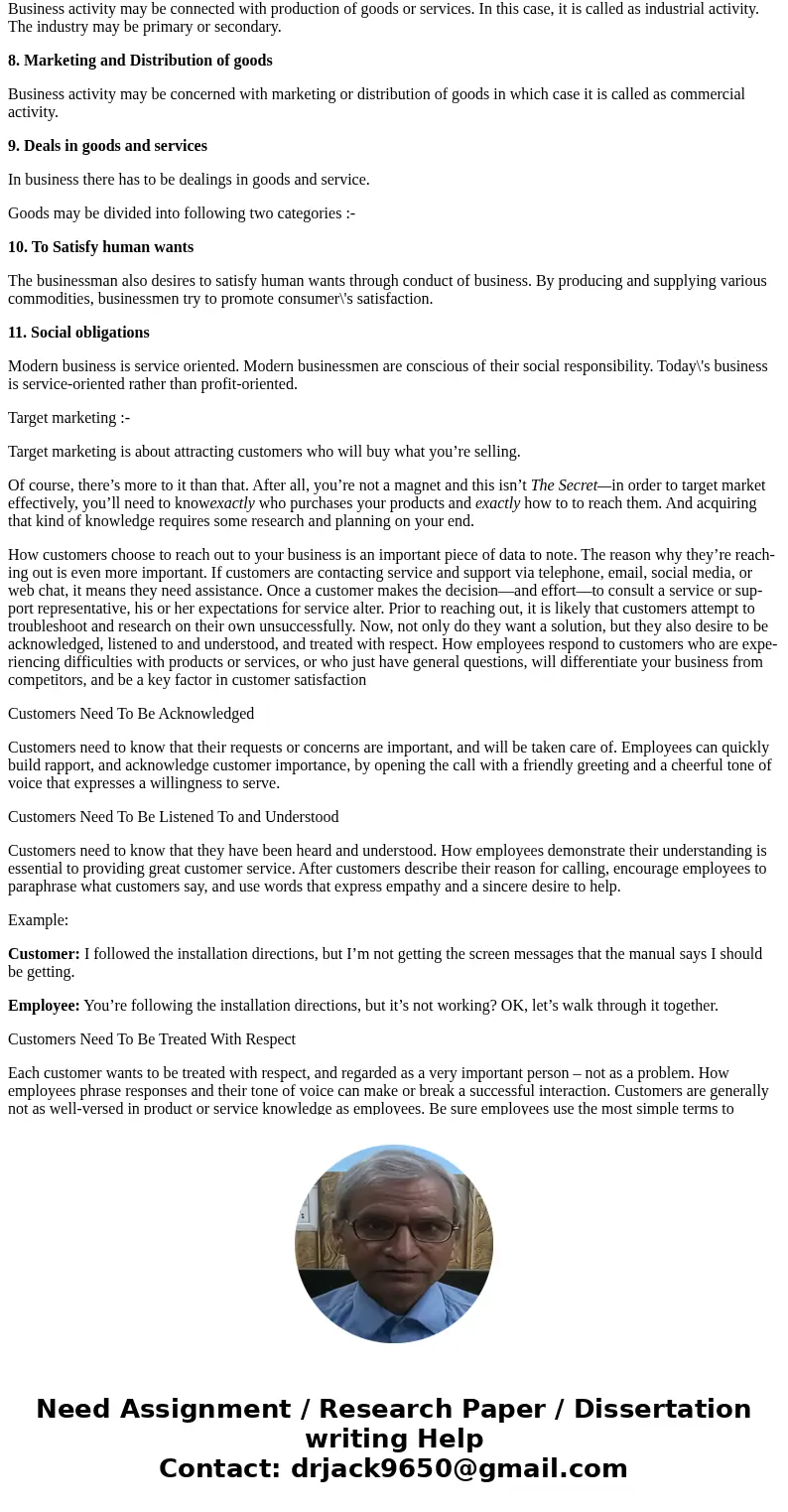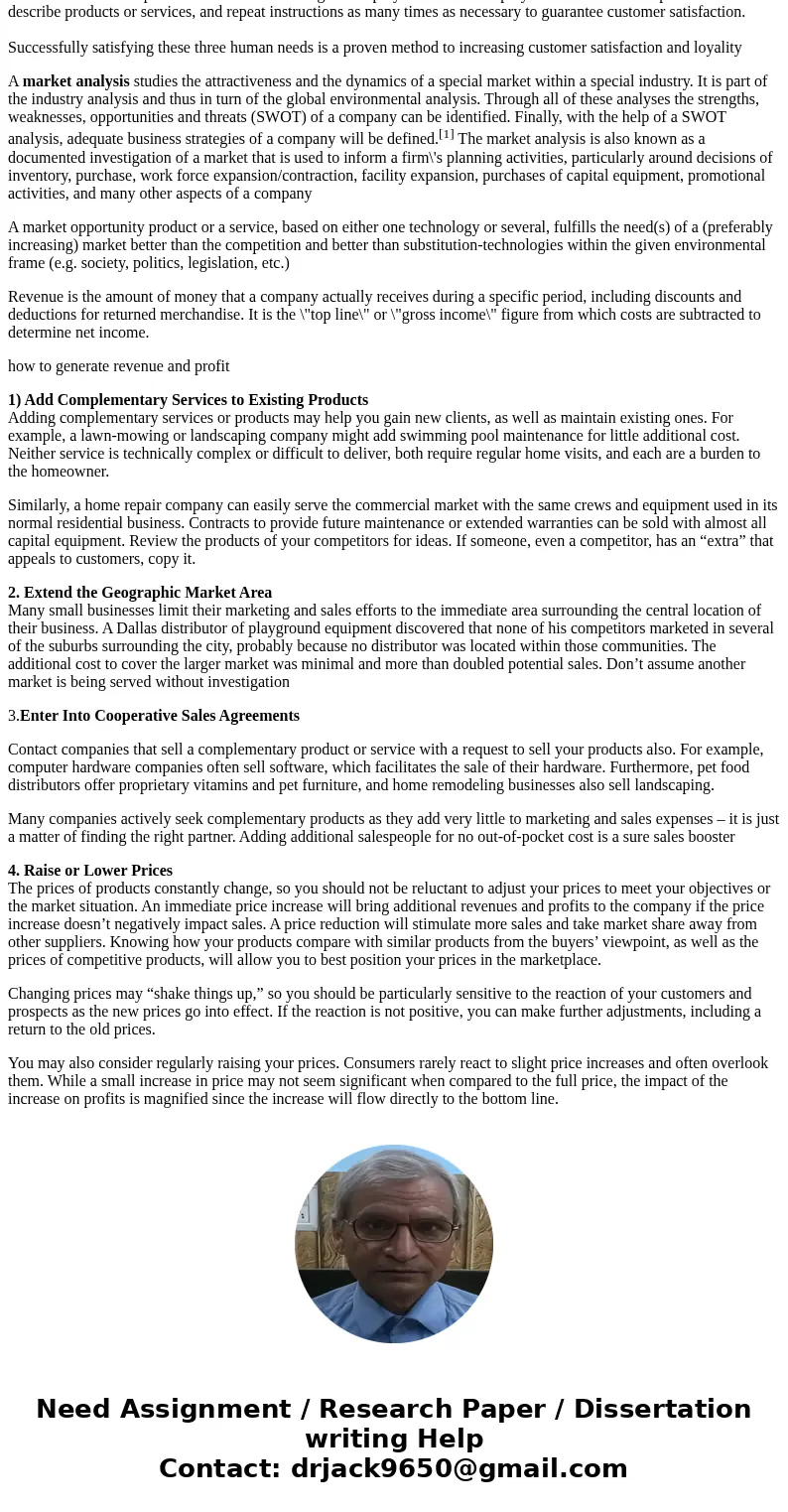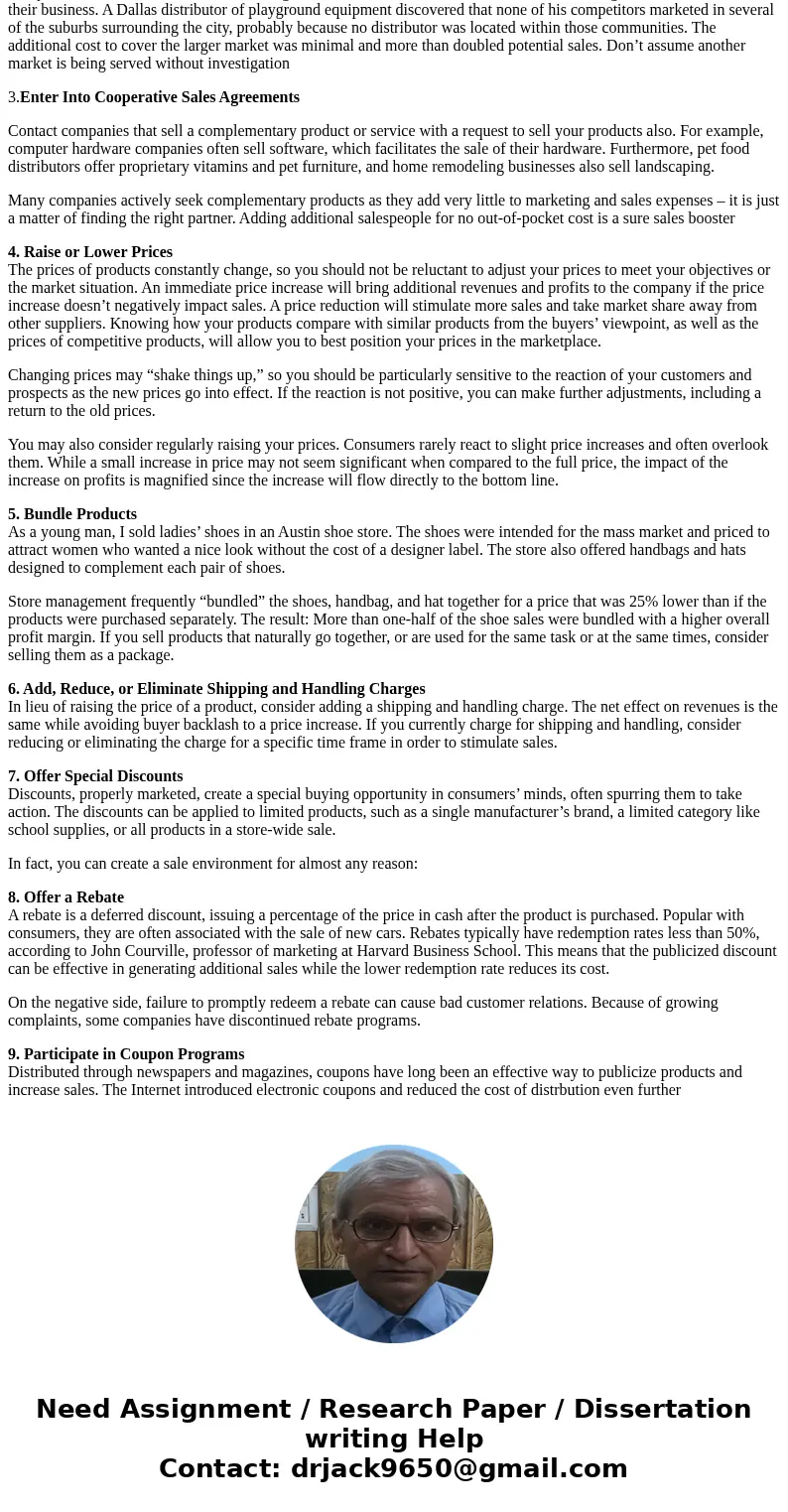Upload a pdf or Word document with a brief description of yo
Solution
The business is defined as An organization or economic system where goods and services are exchanged for one another or for money.
Every business requires some form of investment and enough customers to whom its output can be sold on a consistent basis in order to make a profit.
According to Dicksee, \"Business refers to a form of activity conducted with an objective of earning profits for the benefit of those on whose behalf the activity is conducted.\"
Lewis Henry defines business as, \"Human activity directed towards producing or acquiring wealth through buying and selling of goods.\"
Thus, the term business means continuous production and distribution of goods and services with the aim of earning profits under uncertain market conditions.
Business is unique we can say by the features of that
Features of Business
Characteristics or features of business are discussed in following points :-
1. Exchange of goods and services
All business activities are directly or indirectly concerned with the exchange of goods or services for money or money\'s worth.
2. Deals in numerous transactions
In business, the exchange of goods and services is a regular feature. A businessman regularly deals in a number of transactions and not just one or two transactions.
3. Profit is the main Objective
The business is carried on with the intention of earning a profit. The profit is a reward for the services of a businessman.
4. Business skills for economic success
Anyone cannot run a business. To be a good businessman, one needs to have good business qualities and skills. A businessman needs experience and skill to run a business.
5. Risks and Uncertainties
Business is subject to risks and uncertainties. Some risks, such as risks of loss due to fire and theft can be insured. There are also uncertainties, such as loss due to change in demand or fall in price cannot be insured and must be borne by the businessman.
6. Buyer and Seller
Every business transaction has minimum two parties that is a buyer and a seller. Business is nothing but a contract or an agreement between buyer and seller.
7. Connected with production
Business activity may be connected with production of goods or services. In this case, it is called as industrial activity. The industry may be primary or secondary.
8. Marketing and Distribution of goods
Business activity may be concerned with marketing or distribution of goods in which case it is called as commercial activity.
9. Deals in goods and services
In business there has to be dealings in goods and service.
Goods may be divided into following two categories :-
10. To Satisfy human wants
The businessman also desires to satisfy human wants through conduct of business. By producing and supplying various commodities, businessmen try to promote consumer\'s satisfaction.
11. Social obligations
Modern business is service oriented. Modern businessmen are conscious of their social responsibility. Today\'s business is service-oriented rather than profit-oriented.
Target marketing :-
Target marketing is about attracting customers who will buy what you’re selling.
Of course, there’s more to it than that. After all, you’re not a magnet and this isn’t The Secret—in order to target market effectively, you’ll need to knowexactly who purchases your products and exactly how to to reach them. And acquiring that kind of knowledge requires some research and planning on your end.
How customers choose to reach out to your business is an important piece of data to note. The reason why they’re reaching out is even more important. If customers are contacting service and support via telephone, email, social media, or web chat, it means they need assistance. Once a customer makes the decision—and effort—to consult a service or support representative, his or her expectations for service alter. Prior to reaching out, it is likely that customers attempt to troubleshoot and research on their own unsuccessfully. Now, not only do they want a solution, but they also desire to be acknowledged, listened to and understood, and treated with respect. How employees respond to customers who are experiencing difficulties with products or services, or who just have general questions, will differentiate your business from competitors, and be a key factor in customer satisfaction
Customers Need To Be Acknowledged
Customers need to know that their requests or concerns are important, and will be taken care of. Employees can quickly build rapport, and acknowledge customer importance, by opening the call with a friendly greeting and a cheerful tone of voice that expresses a willingness to serve.
Customers Need To Be Listened To and Understood
Customers need to know that they have been heard and understood. How employees demonstrate their understanding is essential to providing great customer service. After customers describe their reason for calling, encourage employees to paraphrase what customers say, and use words that express empathy and a sincere desire to help.
Example:
Customer: I followed the installation directions, but I’m not getting the screen messages that the manual says I should be getting.
Employee: You’re following the installation directions, but it’s not working? OK, let’s walk through it together.
Customers Need To Be Treated With Respect
Each customer wants to be treated with respect, and regarded as a very important person – not as a problem. How employees phrase responses and their tone of voice can make or break a successful interaction. Customers are generally not as well-versed in product or service knowledge as employees. Be sure employees use the most simple terms to describe products or services, and repeat instructions as many times as necessary to guarantee customer satisfaction.
Successfully satisfying these three human needs is a proven method to increasing customer satisfaction and loyality
A market analysis studies the attractiveness and the dynamics of a special market within a special industry. It is part of the industry analysis and thus in turn of the global environmental analysis. Through all of these analyses the strengths, weaknesses, opportunities and threats (SWOT) of a company can be identified. Finally, with the help of a SWOT analysis, adequate business strategies of a company will be defined.[1] The market analysis is also known as a documented investigation of a market that is used to inform a firm\'s planning activities, particularly around decisions of inventory, purchase, work force expansion/contraction, facility expansion, purchases of capital equipment, promotional activities, and many other aspects of a company
A market opportunity product or a service, based on either one technology or several, fulfills the need(s) of a (preferably increasing) market better than the competition and better than substitution-technologies within the given environmental frame (e.g. society, politics, legislation, etc.)
Revenue is the amount of money that a company actually receives during a specific period, including discounts and deductions for returned merchandise. It is the \"top line\" or \"gross income\" figure from which costs are subtracted to determine net income.
how to generate revenue and profit
1) Add Complementary Services to Existing Products
Adding complementary services or products may help you gain new clients, as well as maintain existing ones. For example, a lawn-mowing or landscaping company might add swimming pool maintenance for little additional cost. Neither service is technically complex or difficult to deliver, both require regular home visits, and each are a burden to the homeowner.
Similarly, a home repair company can easily serve the commercial market with the same crews and equipment used in its normal residential business. Contracts to provide future maintenance or extended warranties can be sold with almost all capital equipment. Review the products of your competitors for ideas. If someone, even a competitor, has an “extra” that appeals to customers, copy it.
2. Extend the Geographic Market Area
Many small businesses limit their marketing and sales efforts to the immediate area surrounding the central location of their business. A Dallas distributor of playground equipment discovered that none of his competitors marketed in several of the suburbs surrounding the city, probably because no distributor was located within those communities. The additional cost to cover the larger market was minimal and more than doubled potential sales. Don’t assume another market is being served without investigation
3.Enter Into Cooperative Sales Agreements
Contact companies that sell a complementary product or service with a request to sell your products also. For example, computer hardware companies often sell software, which facilitates the sale of their hardware. Furthermore, pet food distributors offer proprietary vitamins and pet furniture, and home remodeling businesses also sell landscaping.
Many companies actively seek complementary products as they add very little to marketing and sales expenses – it is just a matter of finding the right partner. Adding additional salespeople for no out-of-pocket cost is a sure sales booster
4. Raise or Lower Prices
The prices of products constantly change, so you should not be reluctant to adjust your prices to meet your objectives or the market situation. An immediate price increase will bring additional revenues and profits to the company if the price increase doesn’t negatively impact sales. A price reduction will stimulate more sales and take market share away from other suppliers. Knowing how your products compare with similar products from the buyers’ viewpoint, as well as the prices of competitive products, will allow you to best position your prices in the marketplace.
Changing prices may “shake things up,” so you should be particularly sensitive to the reaction of your customers and prospects as the new prices go into effect. If the reaction is not positive, you can make further adjustments, including a return to the old prices.
You may also consider regularly raising your prices. Consumers rarely react to slight price increases and often overlook them. While a small increase in price may not seem significant when compared to the full price, the impact of the increase on profits is magnified since the increase will flow directly to the bottom line.
5. Bundle Products
As a young man, I sold ladies’ shoes in an Austin shoe store. The shoes were intended for the mass market and priced to attract women who wanted a nice look without the cost of a designer label. The store also offered handbags and hats designed to complement each pair of shoes.
Store management frequently “bundled” the shoes, handbag, and hat together for a price that was 25% lower than if the products were purchased separately. The result: More than one-half of the shoe sales were bundled with a higher overall profit margin. If you sell products that naturally go together, or are used for the same task or at the same times, consider selling them as a package.
6. Add, Reduce, or Eliminate Shipping and Handling Charges
In lieu of raising the price of a product, consider adding a shipping and handling charge. The net effect on revenues is the same while avoiding buyer backlash to a price increase. If you currently charge for shipping and handling, consider reducing or eliminating the charge for a specific time frame in order to stimulate sales.
7. Offer Special Discounts
Discounts, properly marketed, create a special buying opportunity in consumers’ minds, often spurring them to take action. The discounts can be applied to limited products, such as a single manufacturer’s brand, a limited category like school supplies, or all products in a store-wide sale.
In fact, you can create a sale environment for almost any reason:
8. Offer a Rebate
A rebate is a deferred discount, issuing a percentage of the price in cash after the product is purchased. Popular with consumers, they are often associated with the sale of new cars. Rebates typically have redemption rates less than 50%, according to John Courville, professor of marketing at Harvard Business School. This means that the publicized discount can be effective in generating additional sales while the lower redemption rate reduces its cost.
On the negative side, failure to promptly redeem a rebate can cause bad customer relations. Because of growing complaints, some companies have discontinued rebate programs.
9. Participate in Coupon Programs
Distributed through newspapers and magazines, coupons have long been an effective way to publicize products and increase sales. The Internet introduced electronic coupons and reduced the cost of distrbution even further




 Homework Sourse
Homework Sourse